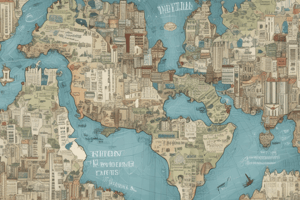Podcast
Questions and Answers
How does international trade impact economic growth?
How does international trade impact economic growth?
International trade positively impacts economic growth by increasing competition, innovation, productivity, and efficiency.
What is globalization and how is it related to international trade?
What is globalization and how is it related to international trade?
Globalization is the interconnectedness of the world's economies, and international trade is a key driver of globalization by encouraging the flow of goods, services, capital, and information across borders.
Explain the concept of comparative advantage in international trade.
Explain the concept of comparative advantage in international trade.
Comparative advantage refers to a country's ability to produce goods or services at a lower opportunity cost than other countries, leading to specialization and trade benefits.
What is the importance of trade balance in international trade?
What is the importance of trade balance in international trade?
How do trade agreements influence international trade?
How do trade agreements influence international trade?
What is the difference between a trade surplus and a trade deficit?
What is the difference between a trade surplus and a trade deficit?
Explain the concept of comparative advantage and how it can benefit countries.
Explain the concept of comparative advantage and how it can benefit countries.
What are trade agreements, and what benefits do they provide?
What are trade agreements, and what benefits do they provide?
How does trade balance reflect a country's economic preferences?
How does trade balance reflect a country's economic preferences?
Discuss the role of international trade in promoting globalization and economic growth.
Discuss the role of international trade in promoting globalization and economic growth.
Flashcards are hidden until you start studying
Study Notes
International Trade: Understanding its Impacts and Concepts
International trade, simply put, is the buying and selling of goods and services across national borders. This exchange of products and ideas plays a pivotal role in shaping the global economy, fostering growth, and promoting better living standards worldwide. In this article, we'll delve deeper into the key aspects of international trade, including its impact on economic growth, the forces of globalization, trade balance, comparative advantage, and trade agreements.
Economic Growth
International trade has been shown to positively impact economic growth. When a country opens up its markets and trades with the rest of the world, it can benefit from a more diverse range of products and services, leading to increased competition and innovation. This competition, in turn, encourages companies to produce higher-quality goods and services more efficiently, leading to increased productivity and growth.
Globalization
Globalization refers to the growing interconnectedness of the world's economies. International trade is a key driver of globalization, encouraging the free flow of goods, services, capital, and information across borders. Globalization has brought about numerous benefits, such as greater access to markets, increased competition, and improved efficiency. However, it has also led to some challenges, including income inequality, job displacement, and environmental concerns.
Trade Balance
Trade balance, also known as the balance of trade, refers to the difference between a country's exports and imports. A trade balance is typically expressed in terms of surplus or deficit. A surplus occurs when a country exports more than it imports, while a deficit occurs when a country imports more than it exports. A trade deficit is not necessarily a sign of economic weakness but rather a reflection of a country's economic preferences and its role in global trade.
Comparative Advantage
The principle of comparative advantage, introduced by economist David Ricardo, states that countries should specialize in producing goods and services for which they have a relatively lower opportunity cost compared to other countries. By doing so, countries can benefit from increased efficiency and greater productivity. For example, a country with a lower-cost labor force may specialize in producing labor-intensive goods, while a country with more abundant natural resources may focus on producing resource-intensive goods.
Trade Agreements
Trade agreements, also known as free trade agreements (FTAs) or preferential trade agreements (PTAs), are legal instruments that facilitate the exchange of goods and services among participating countries. These agreements can take different forms, including bilateral agreements, regional agreements, and multilateral agreements. Trade agreements have numerous benefits, including increased market access, reduced tariffs, and the harmonization of trade rules. However, they can also bring about challenges, particularly for developing countries and the most vulnerable segments of society.
In conclusion, international trade plays a vital role in shaping the global economy, driving economic growth, and promoting globalization. By understanding key concepts such as economic growth, globalization, trade balance, comparative advantage, and trade agreements, we can better appreciate the complexities and benefits of international trade. This understanding is essential for policymakers, businesses, and citizens alike to make informed decisions and navigate the ever-changing landscape of global trade.
References: World Trade Organization, "What is international trade?," 2020, https://www.wto.org/english/thewto_e/whatis_e/tif_e/fact2_e.htm. United Nations Conference on Trade and Development (UNCTAD), "The Role of Globalization and International Trade in Economic Growth," 2019, https://unctad.org/system/files/official-document/tdn2019d13_en.pdf. David Ricardo, "On the Principles of Political Economy and Taxation," 1817, Chapter 3, https://www.econlib.org/library/Ricardo/ricPPET.html. Richard Mentzer, "Comparative Advantage," The Conversation, 2017, https://theconversation.com/comparative-advantage-73250. World Trade Organization, "Trade agreements," 2020, https://www.wto.org/english/tratop_e/trade_e.htm. United Nations Conference on Trade and Development (UNCTAD), "Trade agreements and their impact on developing countries," 2019, https://unctad.org/system/files/official-document/tdn2019d14_en.pdf.
Studying That Suits You
Use AI to generate personalized quizzes and flashcards to suit your learning preferences.




